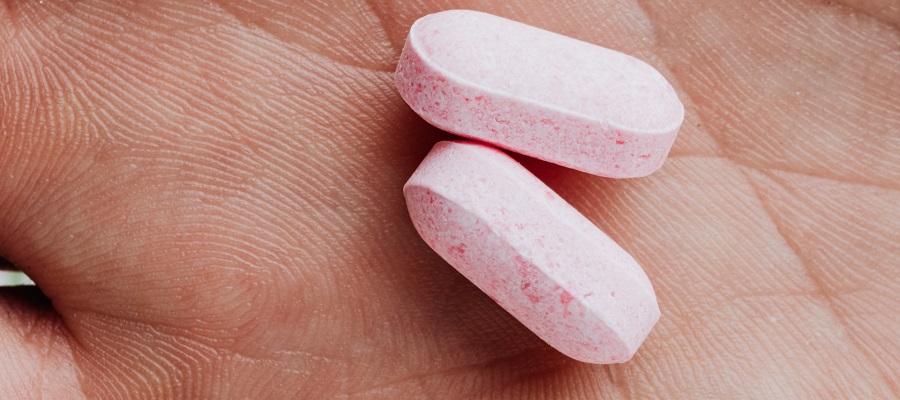What is Vitamin B2?
Vitamin B2, also known as riboflavin, is a water-soluble vitamin that is essential for maintaining good health. It is one of the eight B vitamins and is naturally present in many foods. The body cannot produce vitamin B2 on its own, so it must be obtained through the diet or supplements.
| Attribute | Description |
|---|---|
| Name | Vitamin B2 (Riboflavin) |
| Chemical Formula | C17H20N4O6 |
| Molecular Weight | 376.37 g/mol |
| Solubility | Soluble in water |
| Dietary Sources | Beef liver, almonds, milk, yogurt, eggs, spinach, mushrooms |
| Functions | Essential for energy production, growth, and red blood cell formation |
| Coenzymatic Form | Flavin adenine dinucleotide (FAD) and flavin mononucleotide (FMN) |
| Deficiency Symptoms | Skin disorders, cracked lips, sore throat, anemia |
| Recommended Intake | Adults: 1.3 mg/day (men) and 1.1 mg/day (women) |
| Toxicity | No known toxicity at normal dietary levels |
| Special Considerations | Riboflavin content in food can be reduced by exposure to light and heat |
Functions of Vitamin B2
Vitamin B2 plays a crucial role in many bodily functions. Here are some of the key functions of vitamin B2:
1. Energy Production
Vitamin B2 is involved in the production of energy from food. It helps convert carbohydrates, fats, and proteins into energy that the body can use. Without enough vitamin B2, the body may not be able to produce enough energy, leading to fatigue and weakness.
2. Antioxidant Protection
Vitamin B2 is a powerful antioxidant that helps protect the body from damage caused by free radicals. Free radicals are unstable molecules that can damage cells and contribute to the development of chronic diseases such as cancer, heart disease, and Alzheimer's disease.
3. Skin and Eye Health
Vitamin B2 is important for maintaining healthy skin and eyes. It helps keep the skin and mucous membranes healthy and may help prevent cataracts and other eye conditions.
4. Red Blood Cell Production
Vitamin B2 is necessary for the production of red blood cells, which carry oxygen throughout the body. Without enough vitamin B2, the body may not be able to produce enough red blood cells, leading to anemia.
5. Nervous System Function
Vitamin B2 is important for the proper functioning of the nervous system. It helps maintain the myelin sheath, which is a protective covering around nerve cells. Without enough vitamin B2, the myelin sheath may break down, leading to nerve damage and neurological symptoms.
Sources of Vitamin B2
Vitamin B2 is found in many foods, including:- Milk and dairy products- Eggs- Meat and poultry- Fish and seafood- Leafy green vegetables- Whole grains- Nuts and seedsMost people can get enough vitamin B2 from their diet alone. However, some people may need to take supplements to ensure they are getting enough vitamin B2.
Conclusion
Vitamin B2 is an essential nutrient that plays many important roles in the body. It is important to eat a balanced diet that includes foods rich in vitamin B2 to ensure optimal health. If you are concerned about your vitamin B2 intake, talk to your healthcare provider about whether supplements may be right for you.
Sources of Vitamin B2
| Food | Riboflavin Content per 100g |
|---|---|
| Beef Liver | 3.5 mg |
| Almonds | 1.0-1.3 mg |
| Lamb (Lean) | 0.3-0.4 mg |
| Mushrooms | 0.4-0.5 mg |
| Spinach | 0.2-0.3 mg |
| Salmon | 0.2-0.3 mg |
| Eggs | 0.2 mg |
| Milk | 0.2 mg |
| Yogurt | 0.2 mg |
| Chicken | 0.2 mg |
| Whole Grains | 0.1-0.2 mg |
| Quinoa | 0.1-0.2 mg |
| Avocado | 0.1-0.2 mg |
| Broccoli | 0.1-0.2 mg |
| Asparagus | 0.1-0.2 mg |
| Cottage Cheese | 0.1 mg |
| Cheddar Cheese | 0.1 mg |
Food Sources of Vitamin B2
Vitamin B2, also known as riboflavin, is an essential nutrient that plays a crucial role in maintaining overall health and well-being. It is a water-soluble vitamin that cannot be stored in the body, which means that it needs to be consumed regularly through the diet. Here are some of the best food sources of vitamin B2:
- Milk and dairy products such as cheese and yogurt
- Eggs
- Meat, poultry, and fish
- Leafy green vegetables such as spinach and kale
- Whole grains such as brown rice and quinoa
- Nuts and seeds such as almonds and sunflower seeds
Supplements of Vitamin B2
While it is always best to get your nutrients from whole foods, sometimes it may be necessary to take supplements to meet your daily requirements. Vitamin B2 supplements are available in various forms, including capsules, tablets, and powders. Here are some things to keep in mind when choosing a vitamin B2 supplement:
- Look for a reputable brand that uses high-quality ingredients
- Choose a supplement that contains riboflavin-5-phosphate, which is the active form of vitamin B2
- Check the dosage and make sure it meets your daily requirements
- Consult with a healthcare professional before taking any supplements
It is important to note that taking high doses of vitamin B2 supplements can cause side effects such as diarrhea, increased urine output, and yellow discoloration of the urine. Therefore, it is recommended to stick to the recommended daily intake of vitamin B2, which is 1.3 mg for adult males and 1.1 mg for adult females.In conclusion, vitamin B2 is an essential nutrient that can be obtained through a balanced diet that includes a variety of whole foods. However, if you are unable to meet your daily requirements through diet alone, supplements can be a useful addition. Just make sure to choose a high-quality supplement and consult with a healthcare professional before taking any new supplements.
Recommended Daily Intake of Vitamin B2
Factors Affecting Vitamin B2 Requirements
Vitamin B2, also known as riboflavin, is an essential nutrient that plays a crucial role in maintaining good health. It is a water-soluble vitamin that is not stored in the body, which means that it needs to be replenished regularly through diet or supplements. The recommended daily intake of vitamin B2 varies depending on several factors, including age, gender, and overall health.One of the primary factors affecting vitamin B2 requirements is age. Infants and young children require less vitamin B2 than adults, while pregnant and breastfeeding women need more. The recommended daily intake of vitamin B2 for infants is 0.3-0.4 mg, while children aged 1-3 years need 0.5 mg. Children aged 4-8 years require 0.6 mg, and those aged 9-13 years need 0.9 mg. For adults, the recommended daily intake of vitamin B2 is 1.1-1.3 mg for women and 1.3-1.6 mg for men.Gender is another factor that affects vitamin B2 requirements. Men generally require more vitamin B2 than women due to their larger body size and higher muscle mass. However, women who are pregnant or breastfeeding require more vitamin B2 than men to support the growth and development of their babies.Overall health is also a crucial factor in determining vitamin B2 requirements. People with certain medical conditions, such as celiac disease, Crohn's disease, and ulcerative colitis, may have difficulty absorbing vitamin B2 from food and may require higher doses of supplements. Vegetarians and vegans may also need to consume more vitamin B2 as it is primarily found in animal-based foods.
Recommended Daily Intake of Vitamin B2
The recommended daily intake of vitamin B2 varies depending on age, gender, and overall health. The following are the recommended daily intake of vitamin B2 for different age groups:- Infants (0-6 months): 0.3 mg- Infants (7-12 months): 0.4 mg- Children (1-3 years): 0.5 mg- Children (4-8 years): 0.6 mg- Children (9-13 years): 0.9 mg- Adults (14 years and older): - Women: 1.1-1.3 mg - Men: 1.3-1.6 mgPregnant and breastfeeding women require higher doses of vitamin B2 to support the growth and development of their babies. The recommended daily intake of vitamin B2 for pregnant women is 1.4 mg, while breastfeeding women need 1.6 mg.It is essential to consume a balanced diet that includes foods rich in vitamin B2 to meet the recommended daily intake. Some of the best food sources of vitamin B2 include milk, cheese, yogurt, eggs, meat, fish, and leafy green vegetables. For people who cannot meet their vitamin B2 requirements through diet alone, supplements are available in the form of tablets, capsules, and liquids.In conclusion, vitamin B2 is an essential nutrient that plays a crucial role in maintaining good health. The recommended daily intake of vitamin B2 varies depending on age, gender, and overall health. It is essential to consume a balanced diet that includes foods rich in vitamin B2 to meet the recommended daily intake. If you are unable to meet your vitamin B2 requirements through diet alone, supplements are available to help you meet your needs.
Deficiency of Vitamin B2
Vitamin B2, also known as riboflavin, is an essential nutrient that plays a crucial role in maintaining overall health and well-being. It is a water-soluble vitamin that is required for the proper functioning of various bodily processes, including energy production, metabolism, and the maintenance of healthy skin, eyes, and nervous system.
Causes of Vitamin B2 Deficiency
Vitamin B2 deficiency is relatively rare in developed countries, as it is found in a wide variety of foods, including dairy products, meat, fish, and leafy green vegetables. However, certain factors can increase the risk of developing a deficiency, including:
- A poor diet that is low in vitamin B2-rich foods
- Alcoholism
- Malabsorption disorders, such as celiac disease or Crohn's disease
- Chronic diarrhea
- Use of certain medications, such as oral contraceptives or antacids
Symptoms of Vitamin B2 Deficiency
The symptoms of vitamin B2 deficiency can vary depending on the severity of the deficiency. Mild deficiencies may not cause any noticeable symptoms, while more severe deficiencies can lead to a range of health problems, including:
- Cracked and sore lips
- Inflammation of the tongue
- Skin rashes and lesions
- Eye problems, such as sensitivity to light and blurred vision
- Anemia
- Weakness and fatigue
- Confusion and memory loss
If left untreated, a vitamin B2 deficiency can lead to serious health problems, including nerve damage and an increased risk of certain types of cancer. If you suspect that you may have a vitamin B2 deficiency, it is important to speak with your healthcare provider to determine the underlying cause and develop an appropriate treatment plan.
Health Benefits of Vitamin B2
Vitamin B2, also known as riboflavin, is a water-soluble vitamin that plays a crucial role in maintaining overall health and well-being. It is essential for the proper functioning of the body and is involved in various metabolic processes. In this article, we will discuss some of the health benefits of vitamin B2.
Prevention of Migraines
Migraines are a type of headache that can cause severe pain and discomfort. Studies have shown that vitamin B2 can help prevent migraines. It is believed that vitamin B2 helps to improve the energy production in the brain cells, which reduces the frequency and severity of migraines. In addition, vitamin B2 also helps to reduce inflammation, which is another common cause of migraines.
Prevention of Cataracts
Cataracts are a common eye condition that can cause vision loss. Vitamin B2 has been shown to help prevent cataracts by protecting the eyes from oxidative stress. Oxidative stress is a process that damages the cells in the eyes, leading to cataracts. Vitamin B2 helps to neutralize the free radicals that cause oxidative stress, thereby preventing cataracts.
Boosts Immune System
Vitamin B2 plays a crucial role in boosting the immune system. It helps to produce antibodies, which are proteins that fight off infections and diseases. In addition, vitamin B2 also helps to maintain the health of the mucous membranes, which are the first line of defense against infections. A deficiency in vitamin B2 can weaken the immune system, making the body more susceptible to infections.
Prevention of Anemia
Anemia is a condition in which the body does not have enough red blood cells to carry oxygen to the tissues. Vitamin B2 helps to prevent anemia by aiding in the production of red blood cells. It also helps to maintain the health of the blood vessels, which are responsible for carrying the red blood cells throughout the body. A deficiency in vitamin B2 can lead to anemia, which can cause fatigue, weakness, and shortness of breath.


